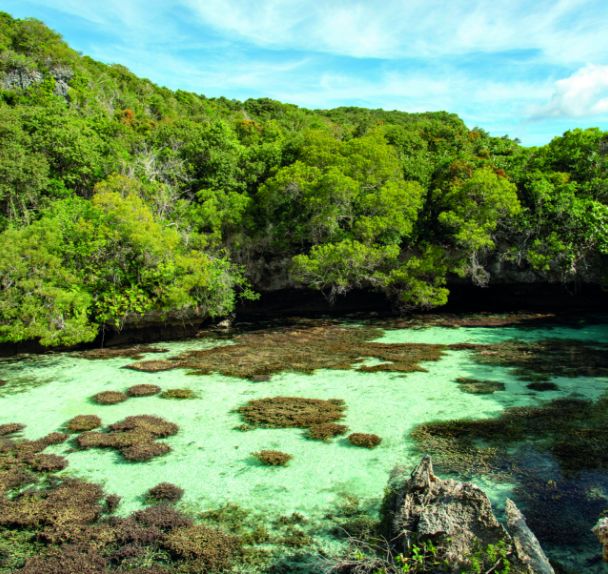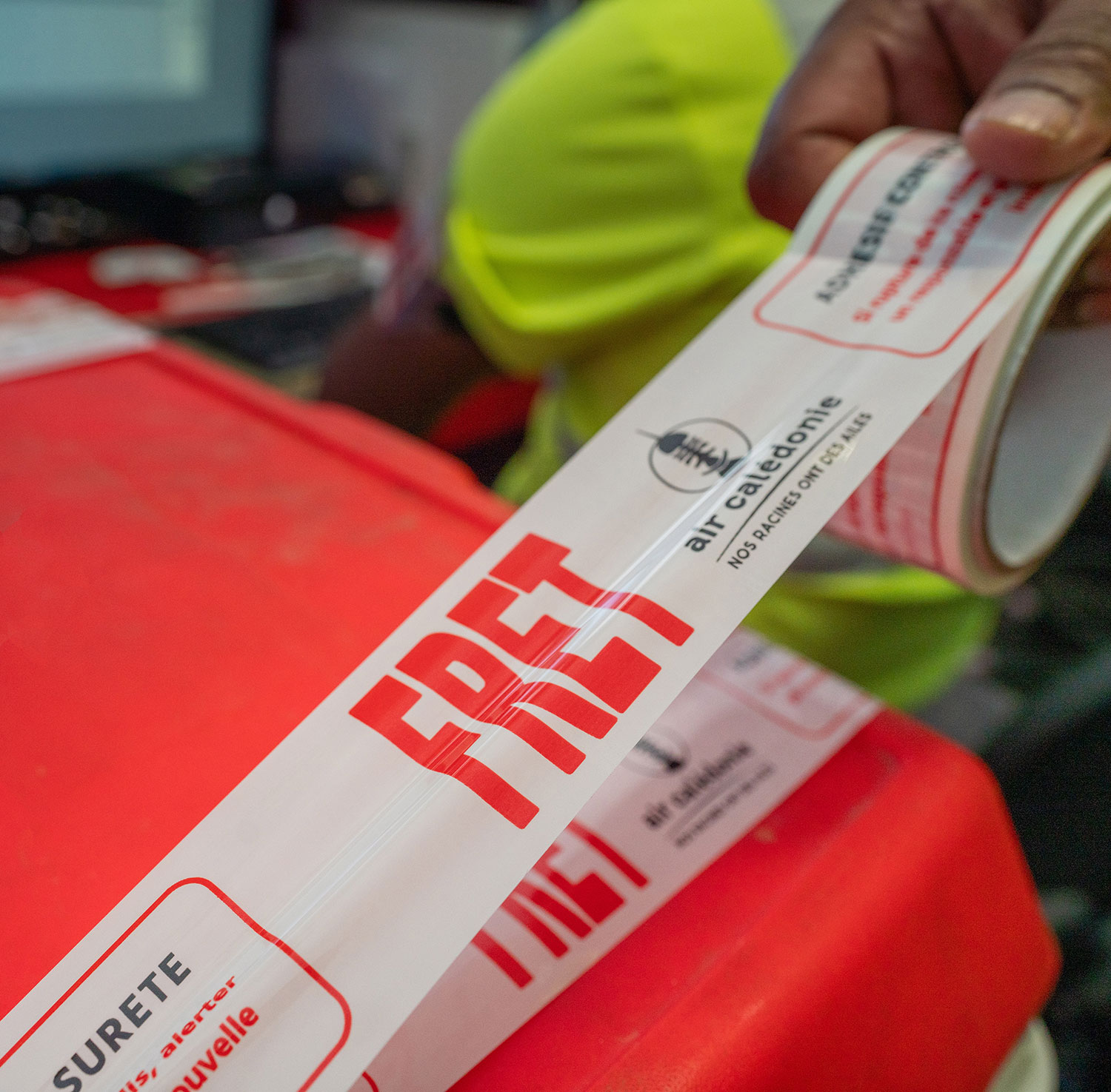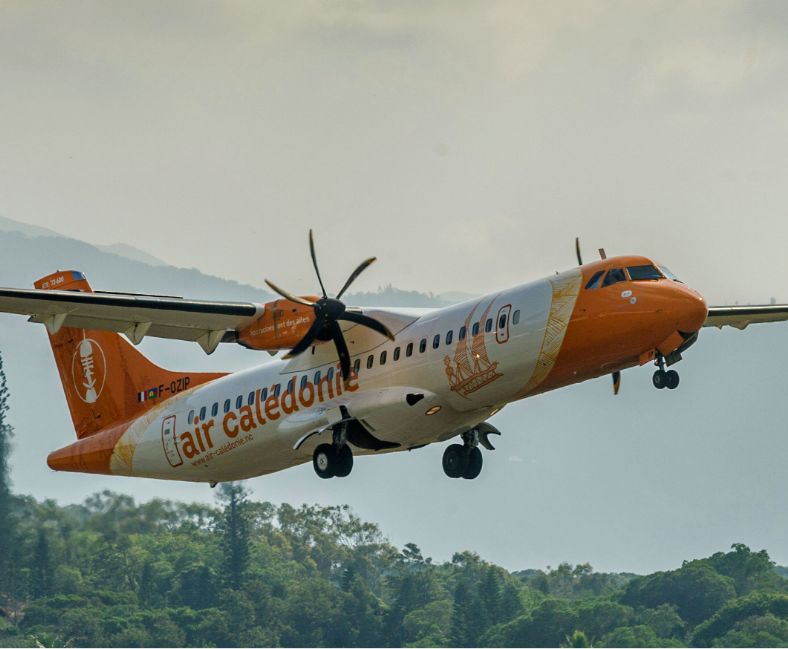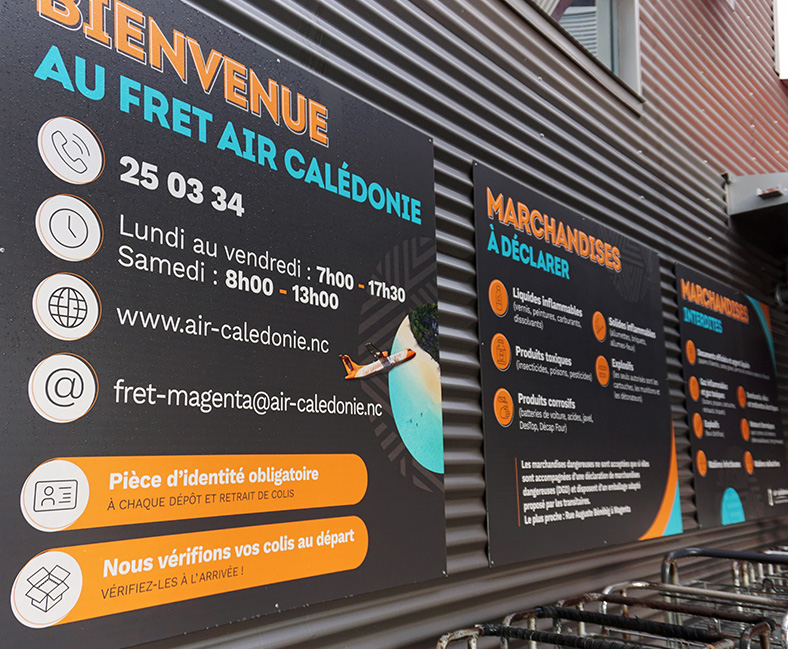
Freight services
Acceptance of the general conditions of transport of goods
The transport of goods carried out by Air Calédonie or its partners is subject to these general conditions. All customers are deemed to have read and accepted these general terms and conditions.
Carrier
Refers to the airline Société Calédonienne de Transports Aériens, known as Air Calédonie, which issued the Air Waybill and/or the airlines which commit to transport the goods from the sender to the recipient.
Air waybill (ATL)
Basic document of air transport constituting a receipt and a contract of carriage.
Sender
Refers to the natural or legal person who sends the goods.
Recipient
Refers to the natural or legal person who receives the goods
Merchandise
Refers to any goods transported or to be transported by aircraft covered by an air waybill
Dangerous goods
Refers to any good transported which presents a significant risk to the safety of people, the contents or the environment during their transport by air. These include explosives (gun cartridges, fireworks, etc.), flammable liquids (varnishes, paints, fuel, etc.), toxic products (insecticides, poisons, etc.), corrosive products (car batteries, acid, etc.), flammable solids (matches, lighters, etc.).
Prohibited goods
Refers to any goods transported that may under no circumstances be transported by the Carrier, such as: flammable gases (butane, propane, diving bottles, fire extinguishers, etc.), toxic gases, spontaneously flammable materials, materials that give off flammable gases in contact with water, infectious substances excepted UN 3373 Biological substance category B, radioactive materials, cash (bills), checks, identity papers, documents such as car registration, drivers licence, etc.
Package
A package defines one or more goods packed in one same packaging.
Warsaw Convention
Convention for the unification of certain rules relating to international carriage by air, signed on October 12, 1929 and amended by the Hague Convention in 1955 and then by the Montreal Protocols in 1975.
Montreal Convention
Convention for the unification of certain rules relating to international carriage by air signed on May 28, 1999 and intended to replace the Warsaw Convention between the signatory countries.
Special Drawing Rights (SDR)
Defines an international monetary instrument created by the International Monetary Fund.
The transport contract applies from the management of the goods by the Carrier until delivery to the destination airport. The transport of goods under the freight carried out by Air Calédonie is governed by the Warsaw and Montreal Conventions as well as the texts in force in New Caledonia and by these general conditions which the sender accepts by signing the Waybill (A.W.B. ).
Unless specifically agreed otherwise, the Carrier undertakes to transport the goods within a reasonable time, without obligation to have a defined timetable. The Carrier may, without notice, use another aircraft or travel on a flight operated by another Carrier and/or by another means of transport. The Carrier may, without notice, cancel, stop, divert, postpone or advance a flight. They can also start a flight without taking all the goods if circumstances require them to do so. The Carrier is authorized to establish an order of routing priority between shipments. The Carrier, if necessary, may hold the shipment before, during or after transportation, after having notified the Shipper or the Consignee in writing.
The applicable prices are those published by the Carrier or calculated by the them in accordance with the fare regulations for the journey indicated on the Air Waybill from the point of departure to the point of destination. They are applicable per kilogram with a minimum charge depending on the type of goods. A service charge per parcel will be applied.
The “24-hour delivery” option means delivery no later than the day after deposit at the freight counter, subject to the flight schedule. Special packages (eg bicycles, tires, etc.) can be offered by contacting your freight agents.
A reduction of 15F/kg on departure from the islands is granted to holders of a valid “Flight Card” (with the express exclusion of companies and licensees)
For all deposits or withdrawals of goods at freight, proof of identity is required.
All packages must be left open at the freight department so that an agent representing the company can check their contents.
The nature of the goods must be declared at the time of deposit. In the event of a false declaration or the fortuitous discovery of dangerous or prohibited materials, the customer is liable to criminal prosecution, with immediate confiscation of the goods and a report may be sent to the Civil Aviation Authority.
In order for your package to be accepted for transport, you must present it in packaging that is suitable for its contents, solid, clean, dry and odorless. It must not be damaged or show signs of damage.
Your merchandise must be sufficiently protected so as not to be damaged or not to damage other packages during the various necessary handling phases and for the duration of its transport. We remind you that the holds of our aircraft are not containerized. Also, your packaging must be suitable and strong enough for your package to support other packages during transport. The goods must be labeled in a legible manner with the mention of the description of the goods and the contact details of the recipient.
The maximum size of packages accepted in the hold is 0.60 m x 1.80 m x 1.20 m and the maximum weight is 30 kg.
Dangerous goods:they must all be declared to the Carrier when they are deposited.
Temperature Controlled Goods: all perishables, seafood, meats or other fresh produce should be placed in a sealed cooler with handles to maintain the required temperatures for the duration of the trip. The sender remains solely responsible for compliance with and control of the hygiene standards applicable to the goods. The cold chain can in no way be ensured by the Carrier, frozen or perishable goods travel at the risk and peril of the customer. The Magenta, Loyalty Islands and Isle of Pines stops are equipped with positive cold rooms available as an option. The Carrier advises the customer to opt for transport of these goods with priority delivery option in 24 hours and storage in a cold room.
Live animals : only domestic dogs and cats are accepted in IATA approved transport cages. Departing from Magenta, a pest control certificate is required. For Isle of Pines, a copy of the customary authority agreement must be provided. The Priority Freight rate is applicable, plus the cost of setting up the file of 2,000 F CFP.
Within the limits of operational and commercial constraints, the goods will be shipped according to the order of priority purchased by the shipper. For a priority departure within 24 hours, the customer must pay for the corresponding option. In the absence of this option, no commitment on the transport time is provided by the Carrier to the customer.
Only the Recipient or their representative can collect the parcel by presenting an identity document. When receiving a freight package, the customer must ensure the conformity of their goods. If the package arrives damaged, the customer must then refuse delivery and declare it immediately to an agent representing the company. If failure to comply with this obligation, no complaint will be accepted subsequently.
Arrived packages are stored in freight for a period of one month; after this time, the goods will be destroyed by the Carrier. Any package showing signs of leakage or advanced decomposition will not be stored and the goods will be destroyed immediately.
The Air Carrier can only be liable for damage occurring during air transport between the point of origin and the point of arrival indicated on the air waybill. The Carrier is not responsible for damage or loss suffered by the goods due to facts which are not attributable to it or presenting the characteristics of force majeure, in particular vice specific to the goods, fault of the shipper or customer in the packaging or marking of fire goods. In the event that the goods destroy or damage the aircraft, other property or passengers on board the aircraft, the Sender and the Recipient shall be required to indemnify the Carrier for the losses or expenses suffered. The Carrier reserves the right to destroy or abandon at any time without notice, and without their liability being engaged, the goods that could endanger the aircraft, people, property on board or present in the premises of the Carrier.
In the event of hazards during the transport of Freight
Operational or commercial constraints may modify the transport of your package by the scheduled flight. In the event of delay or damage, a report must be established with the agents of the stopover concerned, before the goods are withdrawn and brought back to you. No reports will be accepted once the package has been collected. Also, we advise you to check your package’s condition and its contents at the time of its recovery. In the event of a delay in delivery on the Carrier’s behalf and if the sender has paid for the “24-hour delivery” option, the company commits to reimburse to the paying customer the corresponding amount. In accordance with the Montreal Convention, in the event of destruction, loss, damage or delay relating to the transport of goods, the Carrier’s liability is limited to the number of Special Drawing Rights (SDR) applied at the time the AWB was issued. For information only, since December 28, 2019, the liability limit has been set at 22 SDRs per kg transported. The fixed compensation may in no case be greater than the actual value of the goods transported. In the event of a special declaration of interest in value, if accepted by the Carrier, the amount of compensation may reach 100% of the declared value.
Customers wishing to insure special risks (fragility, theft, etc.) or values greater than the Carrier’s limitation of liability are required to take out additional insurance with their own insurer.


 Receive notifications
Receive notifications
 Receive our newsletter
Receive our newsletter





